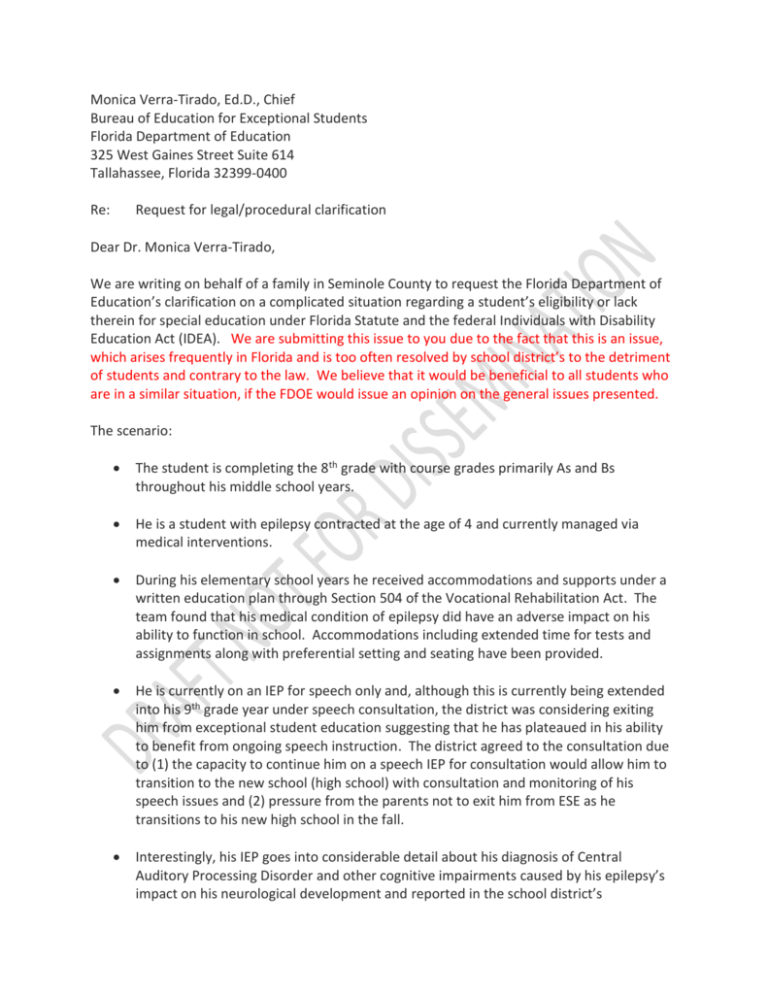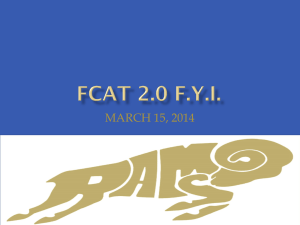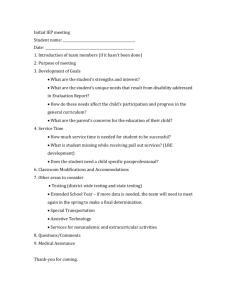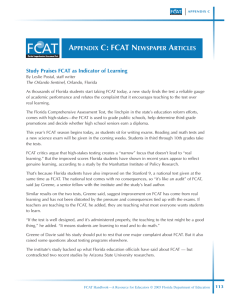Ltr_to_FDOE
advertisement

Monica Verra-Tirado, Ed.D., Chief Bureau of Education for Exceptional Students Florida Department of Education 325 West Gaines Street Suite 614 Tallahassee, Florida 32399-0400 Re: Request for legal/procedural clarification Dear Dr. Monica Verra-Tirado, We are writing on behalf of a family in Seminole County to request the Florida Department of Education’s clarification on a complicated situation regarding a student’s eligibility or lack therein for special education under Florida Statute and the federal Individuals with Disability Education Act (IDEA). We are submitting this issue to you due to the fact that this is an issue, which arises frequently in Florida and is too often resolved by school district’s to the detriment of students and contrary to the law. We believe that it would be beneficial to all students who are in a similar situation, if the FDOE would issue an opinion on the general issues presented. The scenario: The student is completing the 8th grade with course grades primarily As and Bs throughout his middle school years. He is a student with epilepsy contracted at the age of 4 and currently managed via medical interventions. During his elementary school years he received accommodations and supports under a written education plan through Section 504 of the Vocational Rehabilitation Act. The team found that his medical condition of epilepsy did have an adverse impact on his ability to function in school. Accommodations including extended time for tests and assignments along with preferential setting and seating have been provided. He is currently on an IEP for speech only and, although this is currently being extended into his 9th grade year under speech consultation, the district was considering exiting him from exceptional student education suggesting that he has plateaued in his ability to benefit from ongoing speech instruction. The district agreed to the consultation due to (1) the capacity to continue him on a speech IEP for consultation would allow him to transition to the new school (high school) with consultation and monitoring of his speech issues and (2) pressure from the parents not to exit him from ESE as he transitions to his new high school in the fall. Interestingly, his IEP goes into considerable detail about his diagnosis of Central Auditory Processing Disorder and other cognitive impairments caused by his epilepsy’s impact on his neurological development and reported in the school district’s psychological report. It would be fair to state that the accommodations in his current IEP are largely unrelated to his speech deficit but are transferred to his IEP from his previous 504 written education plan. This young man has never passed the FCAT Reading section of the critical state assessment. He has taken it during his elementary school years and each of his middle school years and has consistently scored a level 2 in the reading portion. He has passed the math section with scores of 3. Because of his persistent failure in FCAT Reading he has been automatically provided with Intensive Reading classes, which Seminole County uses as a Tier II intervention for all students not passing the FCAT Reading portion. He has done well in these classes scoring A’s and B’s and was described by this year’s Intensive Reading teacher as “a teachers dream student”. This is because he works hard, invests fully in his instruction, and does well with his homework and tests. His high grades are also a testament to the approximately two hours of instructional support he has received each night from his parents, both of whom are teachers. In November 2010 the family formally requested an evaluation to determine if their son would meet eligibility under Other Health Impairment (OHI) due to 1. His epilepsy and seizure disorder and 2. His inability to pass the FCAT Reading. The district found him not to meet eligibility under OHI as he did not require “specialized instruction”. The debate between the parents has continued for two and a half years and two lengthy meetings were held in May 2012 to once again consider the question. On May 29 th the district once again denied that he meets eligibility for exceptional student education (special education) services over the strong objections of his family and from us. The crux of the issue is whether or not this student requires specialized instruction to receive a free and appropriate public education. The district states he doesn’t require specialized instruction as evidenced by his good grades and his achievement testing in reading that documents average scores across the board. We and the family state he does require specialized instruction via ESE for multiple reasons: o He has diagnosed cognitive deficits including memory and auditory processing issues as a direct result of his epilepsy. Such deficits can be overcome through the direct teaching of specific memory and auditory processing strategies, as well as appropriate accommodations. o He clearly is adversely impacted in his ability to function in school. o He is consistently failing the FCAT even though he has worked hard and done will in his Intensive Reading courses provided through his district’s Tier II RTI interventions the last three years. o This is not a new issue of law. The eligibility of a student with generally good grades, who is however disabled and therefore requires specially designed instruction, to be given an appropriate IEP, is settled law. We have attached, to the end of this letter, a brief legal resume, along with some relevant case law and advisory letters, for your consideration, . The question(s): If this student is an A and B student through diligent effort and hard work but is not able to pass the reading portion of the FCAT in spite of multiple years of Tier II interventions from his school, would he not qualify for intensive specialized instruction through exceptional student education to address his inability to pass the FCAT reading? Is a student’s failure to pass the FCAT Reading portion of the state assessment test sufficient documentation of a need for specialized instruction to allow his school’s IEP team to find him eligible under Other Health Impairment for exceptional student education services? We contend that, because passage of the State of Florida’s Comprehensive Assessment Test in 10th grade is required for graduation with a standard high school diploma, he would qualify for exceptional student education right now. The district shared that he would have two other tests he could take as an alternate if he didn’t pass the 10 th grade FCAT that might help him graduate with a standard high school diploma. However, we and the parents are not willing to take that chance. Also, if he is not on an IEP when he takes the 10 th grade FCAT test, he would be ineligible for the FCAT waiver provision as one of your staff shared with the parents. Thank you in advance for your help with this important clarification. We look forward to hearing from you soon. Very truly yours, Jonathan C. McIntire, PhD Education Consultant Mark Kamleiter, Esq. Special Education Attorney












